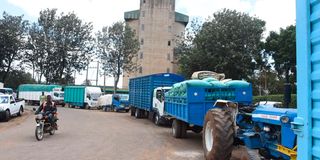How maize stockpiling in hope for attractive prices backfired

Trucks loaded with maize queue to deliver the produce to NCPB, Eldoret depot in Uasin Gishu County on March 11, 2024.
What you need to know:
- A 90-kilogramme bag of maize was going at Sh6,800 three months ago.
- Government plans to buy a million bags of maize at Sh4,000 per a 90kg bag.
Cereal farmers in the North Rift region who hoarded their maize worth millions of shillings hoping to get as much as Sh7,200 per 90-kilogramme bag, are staring at heavy losses as returns for the commodity plummet to Sh2,800 following influx of low cost grain that has destabilised market prices.
The poor millionaires who had stockpiled the staple for months in anticipation of better prices are now flocking the National Cereals and Produce Board (NCPB) depots, keen to accept the Sh,4,000 per a 90-kilogramme bag offered by the board as the prices nose-dive in the local market.
A 90-kilogramme bag of maize was going at Sh6,800 three months ago with fears that the prices were likely to fall following the arrival of low cost grain from East Africa Community (EAC) member states and the harvest of short season crops including beans and potatoes.
A spot check by the Nation in NCPB depots in the region revealed long ques as the distressed farmers rush to dispose of the produce to cushion them from further losses.
The Eldoret NCPB depot for instance is receiving between 5,000 to 8000 bags of maize daily with farmers expecting to cash in on better prices and prompt payment for the produce.
“We have been experiencing long ques of farmers willing to sell the produce to the board for the past two weeks due to better prices as compared to retail market and prompt payment-24 hours after delivery,” said Gilbert Rotich the NCPB North Rift regional manager.
The government plans to buy a million bags of maize at Sh4,000 per a 90 kilogramme bag through the NCPB for the National Strategic Food Reserve.
“We have so far purchased 592,000 of 50-kilogramme bags of maize but there are long ques of farmers willing to deliver the produce to our buying centres,” said Titus Maiyo, NCPB corporate affairs manager.
Most large scale farmers in the region are in a rush to sell their produce to avoid incurring losses due to the tumbling prices.
“The Sh4,000 per 90-kilogramme of maize is much better as compared to Sh3,000 offered by traders due to price instability caused by the market forces of supply and demand,” said James Songok from Kerita farm, Uasin Gishu County who has more than 1,000 bags of the produce in store.
Most of the large scale farmers were reluctant to deliver the produce to NCPB when it opened its doors late last year due to stringent conditions and anticipation the prices would hit above Sh7,200 per a 90 kilogramme bag.
“The government should allocate more funds to NCPB to mop up maize from farmers and cushion them from losses,” said Joel Maina from Moiben who has more than 500 bags of the grain.
The country realised 44 million bags of maize up from 41 million bags last season due to favorable climatic conditions and distribution of subsidised fertiliser among other factors.
President William Ruto’s administration has pledged to put in place measures that will ensure the country does not import maize by 2025.
Agriculture Principal Secretary Kiprono Ronoh while defending the Sh4,000 per bag offered by NCPB as favourable petitioned farmers with excess maize to sell the produce to the board.
“Farmers should take advantage of the government offer through NCPB to sell and store their produce,” appealed the PS in a past interview.
President Ruto late last year banned importation of wheat and maize produce to protect local market from cheaply imported grain that will destabilise prices.
He halted issuance of new permits to import the cereals noting that his administration will only rescind the decision only in the event the country experiences shortage.
“No permits will be issued to millers to import wheat or maize into the country. This is meant to protect our farmers against price fluctuation in the market,” explained Dr Ruto.
But agriculture and food experts said most millers and traders will be willing to import the commodity due to strengthening of Kenyan shilling against the dollar.
“The exchange rate of the shilling against the dollar is almost stabilising meaning that maize prices will be fair when it is imported into the country,” said John Korir, a trader dealing in import and export of agricultural commodities.
The shilling is exchanging at 130.4 against the dollar that is still hurting the local economy.
Interviewed millers said the entry of maize from Tanzania and Uganda has contributed to the lowing the cost of the staple in the local market.
Tanzania is the major exporter of maize and rice to Kenya and other East and countries, including eastern DR Congo, Burundi and South Sudan.
“The maize prices are expected to plummet further due to harvest of short term crops-potatoes, beans among other alternative food crops to maize,” said Joshua Kosgei, an Eldoret based miller.
The millers want the government to harmonise standards for cess and levies across the counties to facilitate steady flow of maize to sustain operations and stabilise prices.





